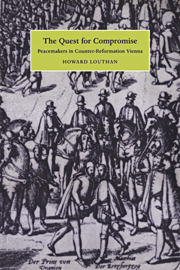Book contents
- Frontmatter
- Contents
- List of illustrations
- Acknowledgments
- A political and cultural chronology
- List of abbreviations
- Introduction
- PART I THE EMERGENCE OF AN IRENIC COURT
- PART II MAXIMILIAN II AND THE HIGH POINT OF IRENICISM
- PART III THE FAILURE OF IRENICISM
- Conclusion: Storm clouds on the horizon: from the great milk war to the Thirty Years War
- Epilogue: The wider circle of irenicism
- Select bibliography
- Index
- CAMBRIDGE STUDIES IN EARLY MODERN HISTORY
Introduction
Published online by Cambridge University Press: 03 December 2009
- Frontmatter
- Contents
- List of illustrations
- Acknowledgments
- A political and cultural chronology
- List of abbreviations
- Introduction
- PART I THE EMERGENCE OF AN IRENIC COURT
- PART II MAXIMILIAN II AND THE HIGH POINT OF IRENICISM
- PART III THE FAILURE OF IRENICISM
- Conclusion: Storm clouds on the horizon: from the great milk war to the Thirty Years War
- Epilogue: The wider circle of irenicism
- Select bibliography
- Index
- CAMBRIDGE STUDIES IN EARLY MODERN HISTORY
Summary
For those scholars scanning the religious topography of central Europe for signs of religious accommodation, the second half of the sixteenth century seems an odd period at which to begin. It is not without reason that historians have dubbed this period the Confessional Age. In the Catholic domains of Germany this era was crucial for the reconquest of this region. The Counter-Reformation gained critical momentum in this half century. The on-again, off-again Council of Trent was finally concluded in 1563. Under the leadership of Peter Canisius the Jesuits made substantial inroads in central Europe. The Wittelsbachs of Bavaria unwaveringly rejected the Reformation and pursued an enthusiastic program of Catholic reform. Protestantism was decisively defeated in Cologne after the flight of its apostate archbishop, Gebhard Truchsess von Waldburg.
At the same time the Lutheran community went through its own process of radicalization. The tireless efforts of the fierce Croat Flacius Illyricus eventually bore fruit. In 1574 the moderate Philippists were expelled from Saxony. A more dogmatic form of Lutheranism took root. With the adoption of the Book of Concord in 1580 the divide between Lutheranism and the wider European Protestant community was deepened. The third of these confessional groups, the Calvinists, also made substantial gains in the latter half of the sixteenth century. Elector Frederick III of the Palatinate adopted their creed, and the margrave of Brandenburg would eventually embrace this faith in 1613. From both a Catholic and Lutheran perspective the Empire's Calvinists were viewed with fear and distrust, and it cannot be denied that the Palatinate pursued an aggressive foreign policy in the second half of the sixteenth century.
- Type
- Chapter
- Information
- The Quest for CompromisePeacemakers in Counter-Reformation Vienna, pp. 1 - 10Publisher: Cambridge University PressPrint publication year: 1997



